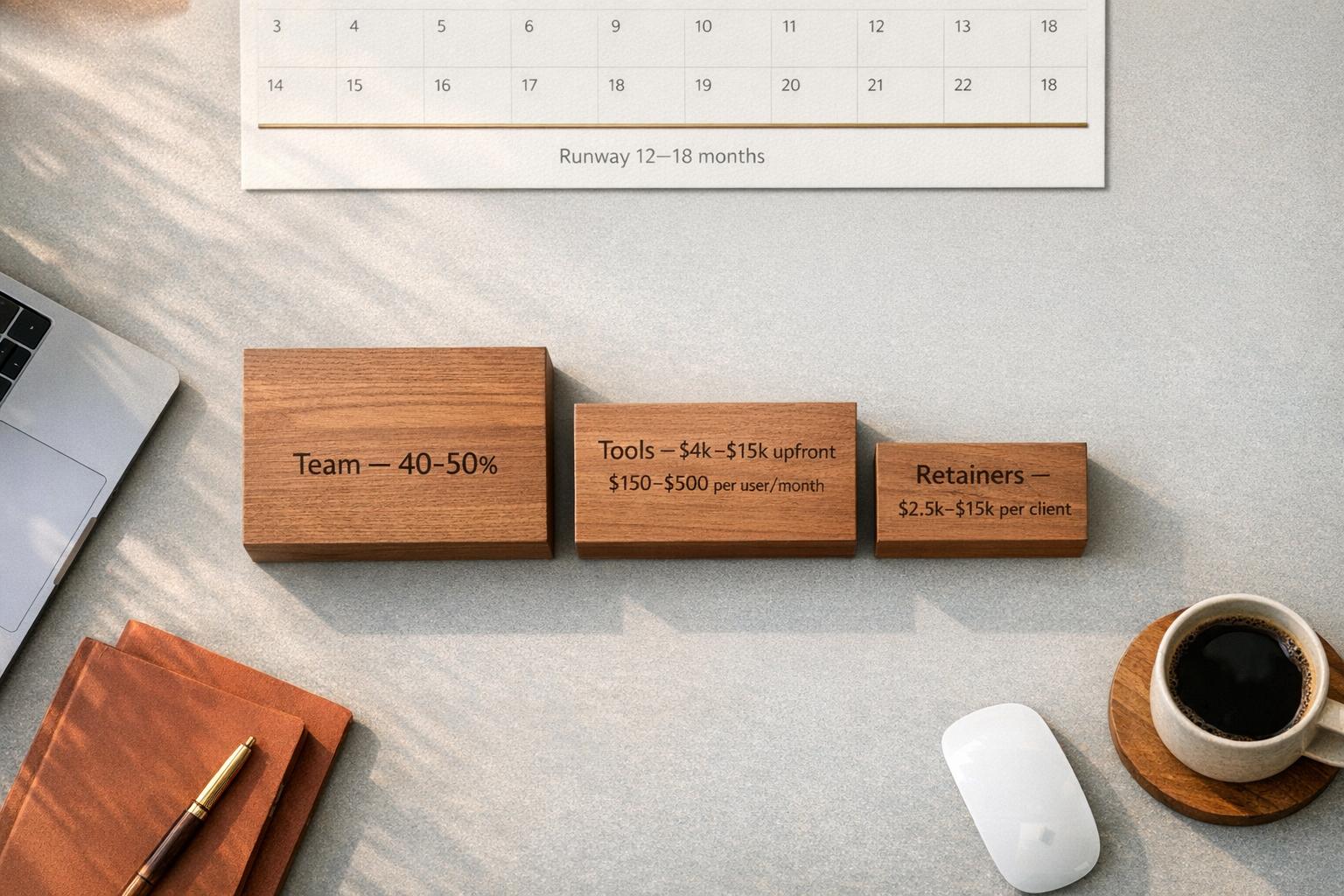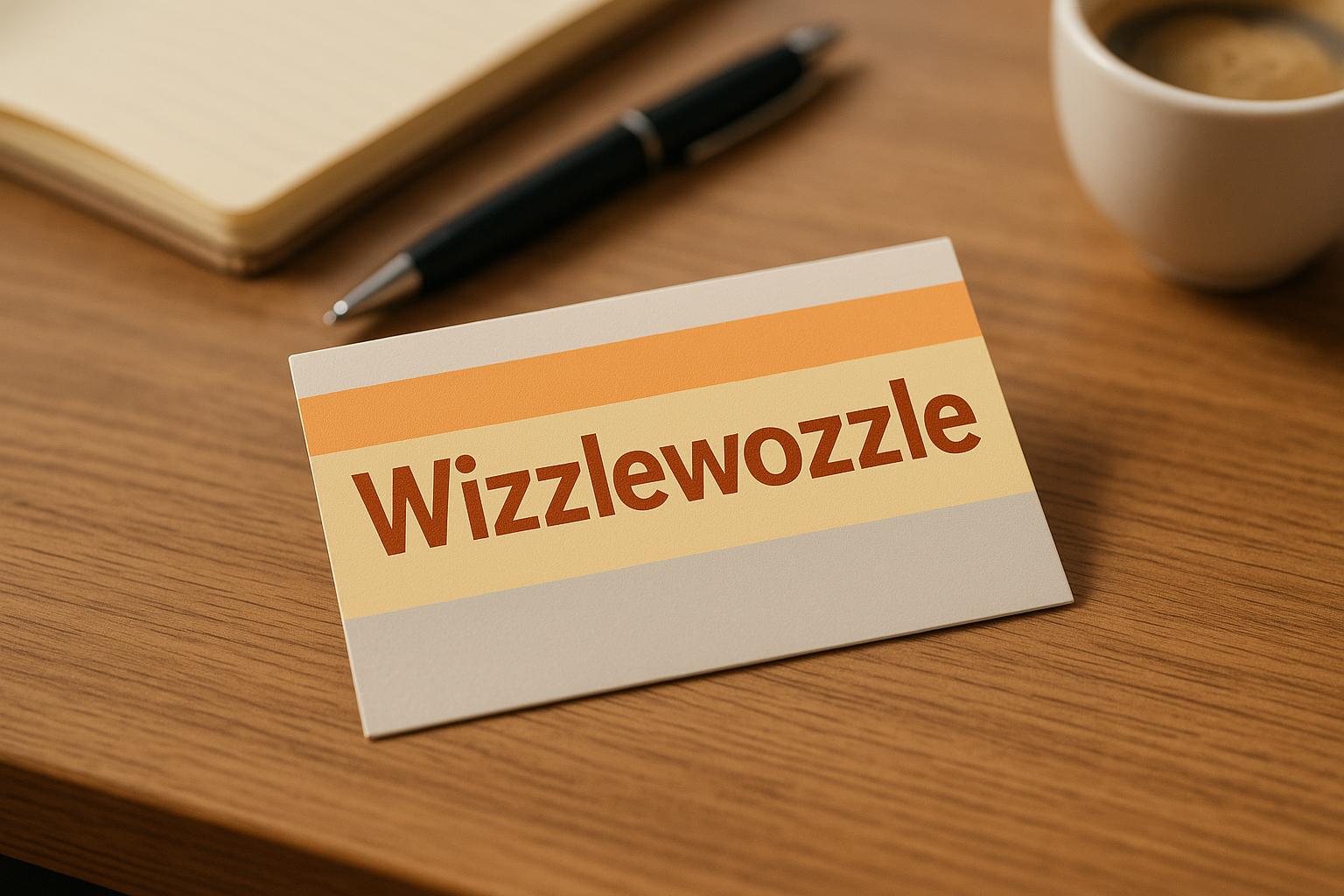
Want a business name people can’t forget? Use the Von Restorff Effect - a psychological principle that helps your brand stand out. This effect explains why we remember things that break patterns. By crafting a name that’s unique, clear, and surprising, you can boost recall by up to 30 times.
Here’s how to make it work:
- Be distinctive: Choose a name that stands out in your industry.
- Play with sounds: Use alliteration or sharp phonetics like "k" and "t."
- Combine unexpected words: Pair unlikely ideas (e.g., Netflix = "internet" + "flicks").
- Test it: Use AI tools like IdeaFloat to ensure your name resonates.
A memorable name isn’t just creative - it’s strategic. Follow these steps to ensure your business name sticks in people’s minds.
How a Business Name Affects Your Brain: Naming Your Business or Brand: 5 Minutes with Louise Karch
The Von Restorff Effect: How Psychology Makes Names Stick
Ever wonder why some business names seem to stick in your mind while others vanish as quickly as they appear? That "stickiness" often comes down to a fascinating psychological principle: the Von Restorff Effect. This concept explains why certain names grab your attention and linger in your memory.
What Is the Von Restorff Effect?
The Von Restorff Effect, also known as the isolation effect, refers to how our brains are wired to remember things that stand out. First identified by German psychiatrist Hedwig von Restorff, it highlights a simple truth: we tend to notice and remember items that break the pattern around them.
How strong is this effect? Studies show people are 30 times more likely to recall a distinctive item - like a blue number in a sea of black ones - compared to something that blends in. That’s not a small difference; it’s a massive advantage businesses can use to make their names unforgettable.
"While the Von Restorff or Isolation Effect asserts that we're hardwired to look for the new and the novel - what stands out is remembered." - Sairah Ashman, Global CEO, Wolff Olins
This instinct to notice the unusual likely evolved as a survival mechanism, helping our ancestors spot threats or opportunities. Today, it’s just as relevant - except now it determines whether your business name sticks in someone’s mind or gets lost in the shuffle.
The takeaway? A name that surprises or disrupts expectations has a far better chance of being remembered.
Why Different Business Names Work Better
Distinctiveness doesn’t just make your brand memorable - it positions it as important in a crowded marketplace. Consider this: 90% of people can’t recall even one brand they saw yesterday, a figure that’s dropped by 20% over the past decade. In today’s noisy world, blending in is a recipe for being ignored.
The Von Restorff Effect gives your brand an edge by tapping into the brain’s natural response to novelty. A name that breaks away from industry norms signals to consumers that it’s worth paying attention to.
Take Monzo Bank as an example. Instead of the usual bland debit cards, Monzo introduced a fluorescent coral card. That bold move didn’t just catch people’s eyes - it helped the company attract over 3 million users in just a few years.
"The Von Restorff effect illustrates how doing something different can help you be remembered." - Oli Smith, Creative Director, Smith.co.uk
The impact of standing out goes beyond just memory. Research on 108 business launches revealed that the 14% operating in untapped markets accounted for 38% of the total revenue impact and a staggering 61% of the total profit impact. Brands perceived as disruptive saw their value grow by 28% over three years, while those lacking distinctiveness declined by 5%.
Consumers are also willing to pay more for brands they see as different - on average, 22% more. In fact, 40% of that premium comes from the perception of difference. Advertising that leverages unique brand assets achieves 34% higher recognition rates. Understanding the Von Restorff Effect is the first step in crafting a name that’s impossible to forget.
How to Use the Von Restorff Effect in Your Business Name
Now that you know why certain names stick in people’s minds, let’s dive into how you can craft a business name that takes full advantage of this psychological principle. The goal? Make your name stand out without losing clarity - it should grab attention but still make sense to your audience.
Play with Sounds and Phonetics
The way a name sounds can evoke specific emotions and associations. For instance, hard consonants like "k", "t", and "p" are often linked to strength and reliability. Interestingly, names starting with "k" appear more frequently in successful brands than in everyday English, which helps them stand out and be remembered.
Alliteration - repeating the same sounds at the beginning of words - can also make a name more memorable. Think of brands like Coca-Cola or Best Buy, where the rhythmic repetition sticks in your head. Vowel sounds play a role too: an "oo" sound might evoke comfort and calm (like in "Google"), while a sharp "a" can suggest energy and action (as in "Apple"). These phonetic choices aren’t random - they’re strategic moves that shape how people feel about your brand.
Next, let’s look at how blending unexpected ideas can make your name even more distinctive.
Combine Unlikely Words or Concepts
One surefire way to create a memorable name is by pairing ideas that don’t typically go together. This kind of unexpected combination creates a small mental surprise, encouraging people to think about and remember your name.
Take Netflix, for example - it combines "internet" and "flicks" to instantly communicate online movie streaming. Or Pinterest, which merges "pin" and "interest" to capture the idea of collecting things you care about. Similarly, Evernote blends "forever" and "note", evoking lasting digital memory.
"Compound names grab attention, provide clarity and remain timelessly effective." – David Placek, Creative Director and President, Lexicon Branding
To use this technique, start by identifying words that reflect your business’s core values or purpose. Then, experiment with combining them in ways that are surprising yet meaningful. For example, TripAdvisor seamlessly ties "travel advice" and "planning" into a single, memorable name. Don’t limit yourself to your own industry - draw inspiration from nature, common objects, or even unrelated fields to create a name that stops people in their tracks.
Make Your Name Visually and Audibly Distinct
A name isn’t just about how it sounds - it’s also about how it looks. A visually distinctive name can grab attention just as effectively as a catchy sound.
Consider how your name will appear across different platforms - logos, websites, business cards, and social media. Strong typography and design can amplify its impact, ensuring your name leaves a lasting impression wherever it’s seen.
You can also break industry norms by choosing words that disrupt expectations. However, don’t go so far that your name becomes hard to understand or remember. The key is balance: your name should be unique enough to trigger the Von Restorff Effect but still resonate with your audience. Say it out loud, write it down, and imagine it in different contexts to ensure it’s both memorable and practical.
Real Examples: Business Names That Use This Psychology
The Von Restorff Effect shows us how certain names stick in our minds, and some of the world's most famous brands have mastered this art. These companies didn’t just get lucky with memorable names - they carefully crafted them to stand out.
Google: A Twist on Spelling That Sticks
Google is a perfect example of how a slight tweak in spelling can make a name unforgettable. The name comes from the mathematical term "googol", which refers to the number 1 followed by 100 zeros. But the founders intentionally altered the spelling, creating something both unique and easy to remember.
Back in 1998, the search engine world was crowded with names like Yahoo, AltaVista, and Excite. "Google" broke through the noise with its unusual spelling and distinctive sound. This deliberate choice highlights the psychological principles that help names stick.
Zappos: Sounds That Spark Recall
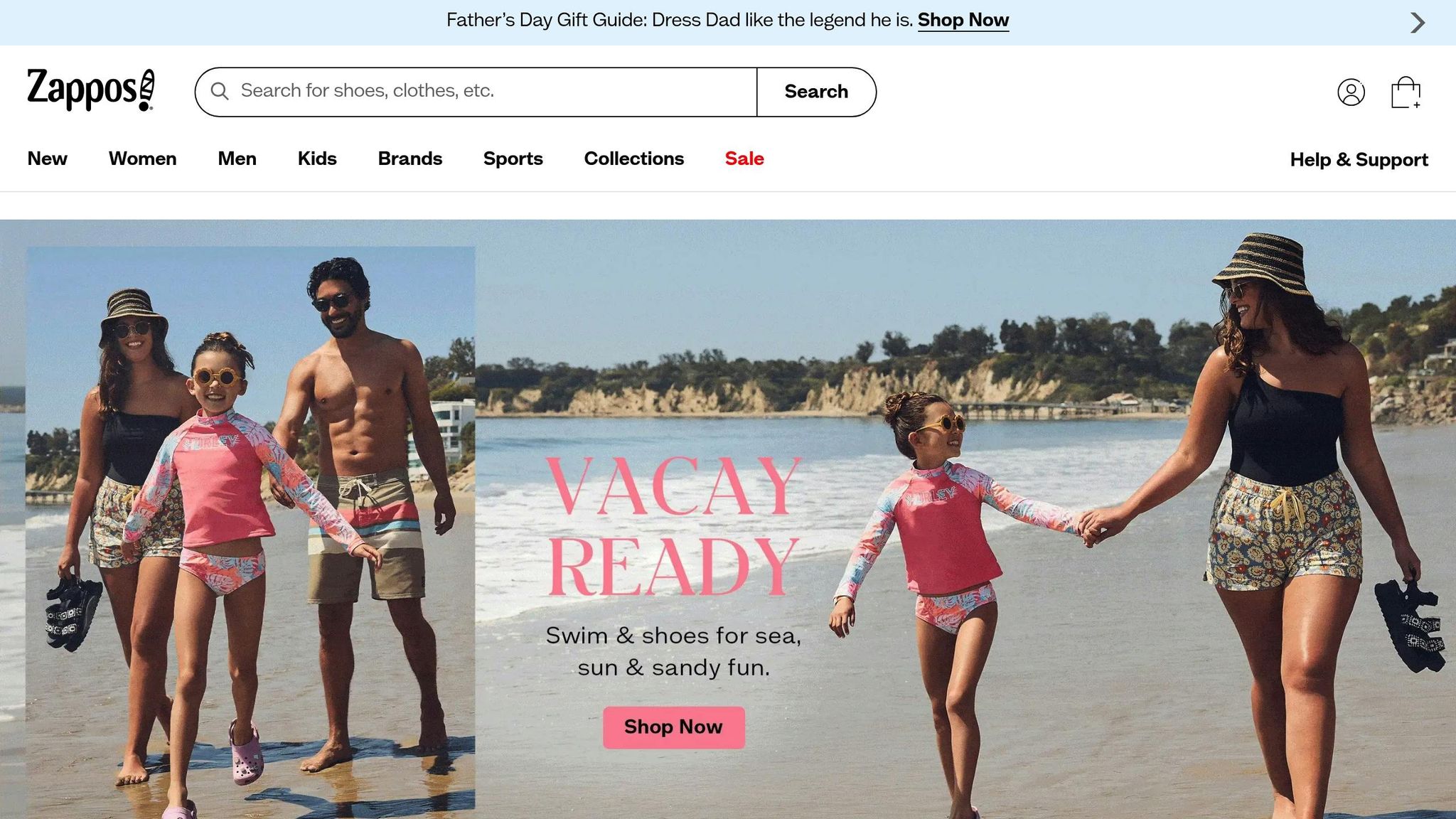
Zappos shows how rebranding with a strong, memorable name can change everything. The company started as ShoeSite.com, but that name didn’t stand out. Inspired by the Spanish word "zapatos" (meaning shoes), they rebranded to Zappos - a name that’s playful, energetic, and easy to recall.
This rebranding made the name not only more distinctive but also more engaging, helping it carve out a space in the competitive online retail market.
Haagen-Dazs: Inventing a Premium Identity
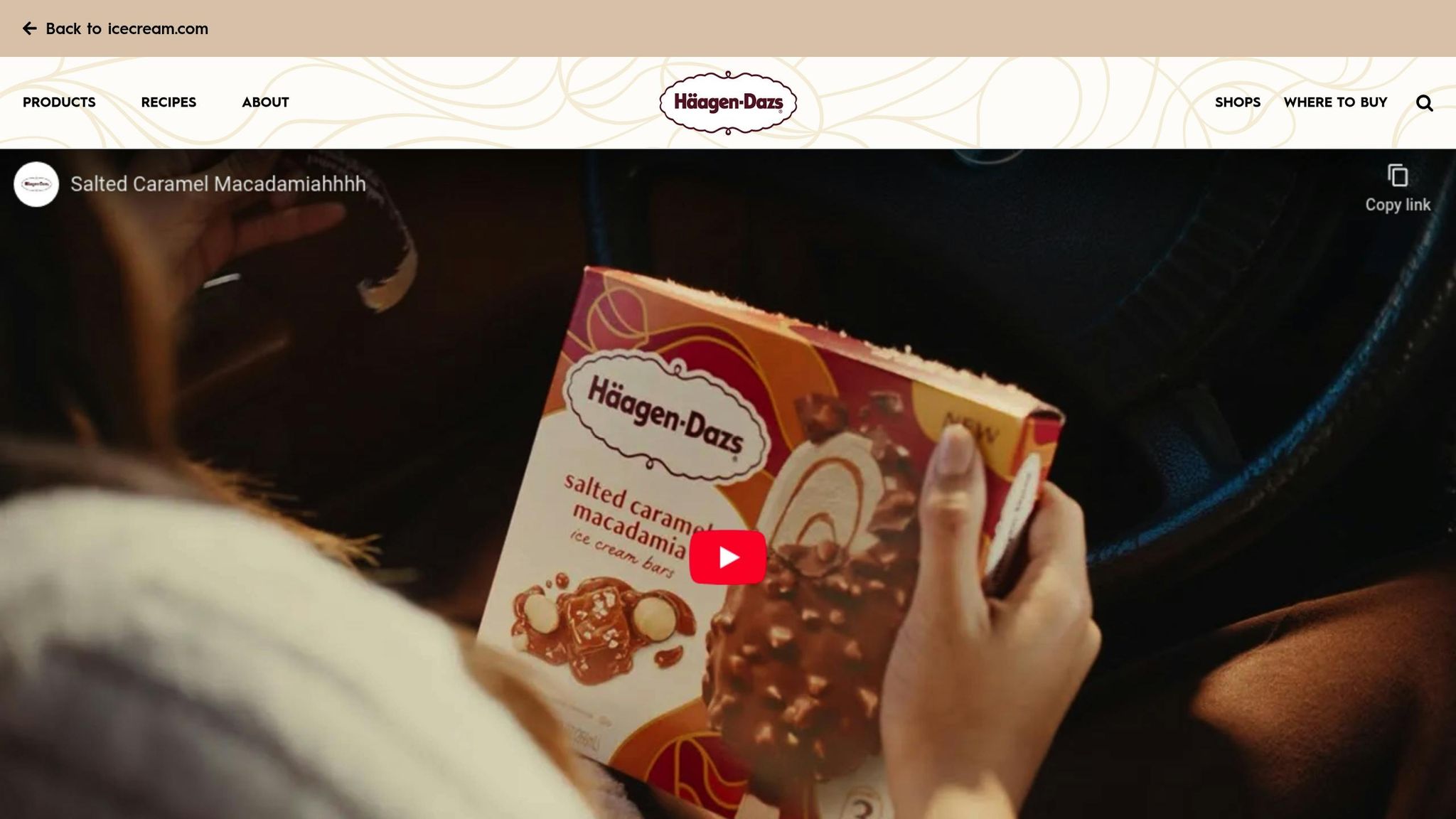
Haagen-Dazs demonstrates the power of creating a completely fabricated name to evoke sophistication. In 1961, Reuben Mattus, an American of Polish descent, came up with the name to give his ice cream brand a European, high-end feel.
The name was designed to sound Danish, complete with an umlaut over the "a" and a map of Denmark on the packaging, even though the brand is American. This clever strategy helped the brand stand out against competitors with more conventional names.
Behavioral scientist Richard Shotton explains:
"Behavioral scientists argue our expectations for products affect our experience, and words are one of the ways of creating that expectation. And so if you make it sound Danish, it has that aura of sophistication and that will actually affect your experience of eating it."
This idea works because it shapes how we perceive the product. A 2005 Cornell study even showed that chocolate pudding with a fancy label received 7% higher taste ratings. Haagen-Dazs’s name isn’t just distinct - it sets the tone for a premium experience.
sbb-itb-08dd11e
Keep It Simple: Balance Unique with Clear
While having a name that stands out is important, keeping it straightforward and culturally appropriate is just as crucial for making it memorable. The Von Restorff Effect highlights that distinctive names stick in people's minds, but there's a fine line - you don't want your name to be so complex that it confuses or alienates potential customers.
Avoid Overly Complex Names
Overcomplicated names can make it hard for people to remember or even find your business. For example, a company named "Floccinaucinihilipilification Company" would face an uphill battle simply because most people wouldn’t be able to recall or spell it.
When choosing a name, aim for something easy to remember, spell, and pronounce. Keep it short enough to fit comfortably on a business card or sign while still clearly reflecting what your brand is about. If people have trouble saying or spelling your name, they’re less likely to share it with others - hurting your chances of organic growth.
Once you’ve landed on a name that’s clear and concise, take the time to ensure it works well across different cultural contexts.
Check for Cultural Sensitivities
Even a well-thought-out name can run into trouble if it carries unintended meanings in other cultures. A notable example is Kim Kardashian West’s shapewear brand, which had to change its name from "Kimono" to "Skims" in 2019 after criticism over cultural appropriation.
To avoid similar pitfalls, start with some basic research. A quick Google search can reveal whether a potential name has any controversial or offensive associations.
- Conduct linguistic checks: Look for unintended meanings in other languages to avoid issues like those faced by Coors and Mitsubishi in the past.
- Get input from diverse voices: Have a culturally diverse group review your name to catch potential problems early.
- Keep monitoring: Cultural norms and perceptions evolve, so it’s a good idea to periodically reassess your name’s appropriateness.
Test Your Business Name with AI Tools
After crafting a name using the Von Restorff Effect to make it stand out and ensuring it aligns with cultural norms, the next step is to test its impact. Testing helps confirm whether the uniqueness you’ve aimed for translates into strong brand recall. AI tools can play a significant role here, helping you gauge how well your name resonates with your audience. Let’s explore how IdeaFloat's AI tools can provide actionable insights.
IdeaFloat's Validation Score for Name Testing
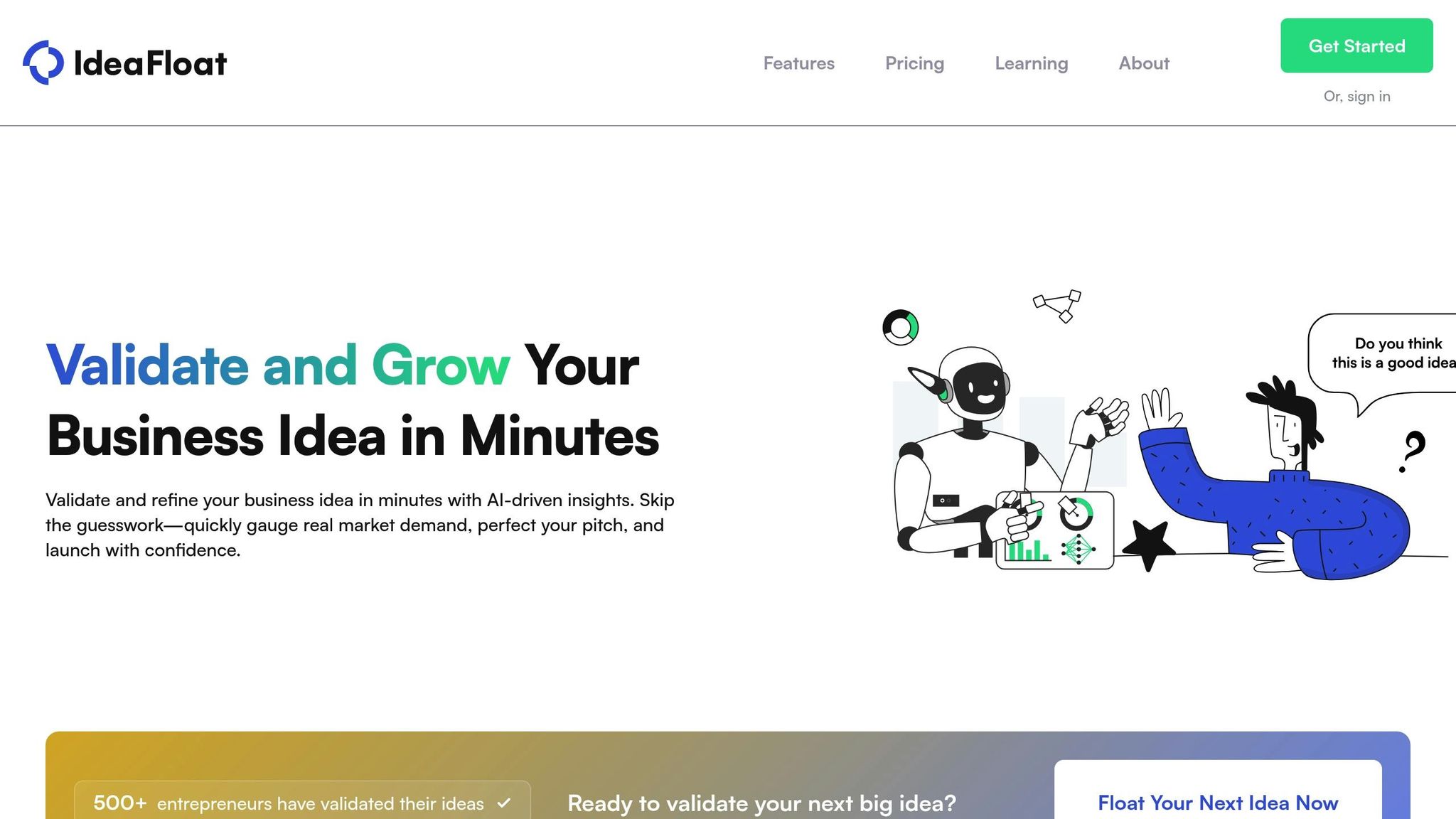
IdeaFloat offers a Validation Score powered by AI to analyze how distinctive and memorable your business name is. This tool generates an objective score, evaluating your name's ability to stick in people’s minds.
Using advanced data analysis, IdeaFloat’s AI examines key factors like distinctiveness, emotional resonance, and psychological principles such as the Von Restorff Effect. By processing large datasets, it identifies patterns in name memorability and uncovers insights that traditional feedback methods might miss.
Gather Real Customer Feedback on Your Name
In addition to automated scoring, IdeaFloat’s feedback tools collect genuine customer reactions. These tools focus on critical aspects like clarity, likeability, uniqueness, and emotional appeal. You can test multiple name options with your target audience, gathering structured feedback to understand what resonates most.
The platform’s real-time dashboards display how each name performs across metrics like memorability and brand fit. This approach not only highlights standout names but also flags potential issues - such as confusion, weak emotional connections, or negative associations - that could hurt your brand’s recall. By addressing these concerns early, you can refine your options and make more informed decisions.
Refine Your Name Through AI Testing
AI testing is most effective when used iteratively. Instead of sticking with your first idea, you can tweak and test your name repeatedly based on live feedback. For example, if your initial name is unique but lacks clarity, you could modify its spelling or pronunciation while preserving its standout qualities. This process allows you to continuously enhance your brand’s memorability and impact.
With tools like IdeaFloat, you’re not just guessing - you’re making data-driven decisions to create a name that truly connects with your audience.
Conclusion: Build a Name People Remember
This guide has highlighted how understanding psychology can shape a brand's identity into something truly memorable. Crafting a standout business name isn’t about luck - it’s about understanding how human memory works. A key principle here is the Von Restorff Effect, which underscores the power of being distinct.
"The Von Restorff explains why taking that leap in doing something different can help you stand out. It's not being different for different sake. It's a strategic tool, for competitive advantage, that can help your organisation get remembered."
– Oli Smith, Creative Director, Smith.co.uk
In a world where people encounter countless brand names every day, standing out is essential. A name that breaks the mold - whether through an unexpected word pairing, a distinctive sound, or a fresh spelling - can significantly boost recall. In fact, research shows that a unique name can increase memorability by as much as 30 times.
The challenge lies in balancing uniqueness with clarity. That’s where tools like IdeaFloat come in. By using data-driven testing, you can ensure your name resonates. IdeaFloat’s AI-powered Validation Score provides insights into how memorable, clear, and emotionally engaging your name is for your audience, removing the guesswork from the process.
Your business name is often the first impression people have of your brand. By combining psychological principles with data-backed tools, you can create a name that doesn’t just identify your business - it ensures it’s unforgettable. A well-chosen name captures attention, evokes emotion, and leaves a lasting impact.
FAQs
How can I make sure my business name works well across different cultures?
How to Choose a Business Name That Works Internationally
When choosing a name for your business, it’s crucial to consider how it will resonate in different parts of the world. Start by diving into the linguistic and cultural subtleties of your target markets. A word or phrase that sounds just right in one region might carry an unintended or even offensive meaning in another. Don’t make assumptions - take the time to explore how your name might be interpreted across various languages and cultures.
Bringing together a diverse team during the naming process can also make a big difference. Different perspectives can help spot potential issues early on, ensuring the name works for a wide range of audiences. Additionally, testing your name with local experts or focus groups in key regions can uncover insights you might not have considered. This approach helps you avoid cultural missteps and ensures your business name feels inclusive, respectful, and appealing no matter where your audience is.
How can I use AI tools to check if my business name is memorable?
When testing how memorable your business name is, AI tools can make the process easier and more insightful. Start with recall tests - show your audience the name briefly and then check how well they remember it later. AI can analyze the feedback to spot trends and patterns in their responses. Some platforms go a step further by using algorithms to assess the name's appeal, offering data-driven insights like recall rates or the emotional reactions it evokes. This kind of analysis can help you fine-tune your business name to leave a stronger impression.
Why is it important to choose a business name that’s both unique and easy to understand?
Choosing a business name that stands out while being easy to understand is crucial for leaving a lasting impression. A distinctive name helps your brand catch attention in a crowded market, while clarity ensures that customers can quickly recognize and remember it. On the other hand, overly complex or abstract names can confuse potential customers and make it harder for your brand to connect with them.
Names that are easy to pronounce, spell, and remember tend to stick in people’s minds and build trust. Striking the right balance between uniqueness and simplicity ensures your business name is both memorable and meaningful to your audience.
Related posts
Get the newest tips and tricks of starting your business!
